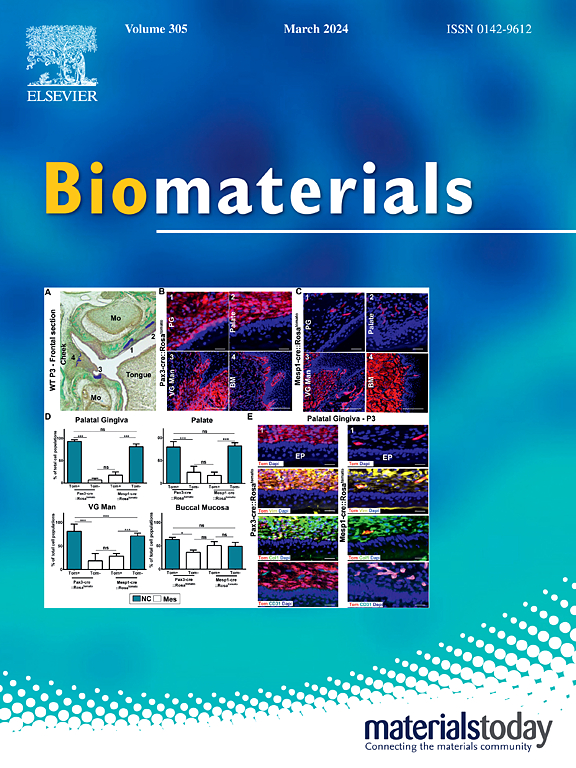Breast implant silicone exposure induces immunogenic response and autoimmune markers in human periprosthetic tissue
IF 12.8
1区 医学
Q1 ENGINEERING, BIOMEDICAL
引用次数: 0
Abstract
Silicone-based breast implants are commonly used, but there are concerns about their long-term safety. While implantation results in the formation of a periprosthetic tissue that isolates the implant from the rest of the host body, silicone can leak and reach surrounding tissues. We combined histological analysis and gene expression profiling (RNA sequencing) of samples from human patients with silicone breast implants with different fillers (silicone or serum), surface topographies and/or shell rupture, and performed systematic cross-comparisons. Our study shows that exposure to silicone gel filler, even in clinically asymptomatic cases, induces an immune response. This response includes the expression of markers associated with various autoimmune diseases. This study provides the first biological evidence of an association between silicone implants and autoimmune markers, highlighting the need for further research and stricter implant safety regulations. We suggest that implant design factors, such as filler type and surface texture, may influence the inflammatory response. Re-evaluation of existing clinical trials is warranted to investigate the association between implant characteristics and potential health risks.
乳房植入硅胶暴露诱导人假体周围组织的免疫原性反应和自身免疫标记。
硅基乳房植入物被广泛使用,但人们担心它们的长期安全性。虽然植入导致假体周围组织的形成,将植入物与宿主身体的其余部分隔离开来,但硅酮可能会泄漏并到达周围组织。我们对使用不同填充物(硅胶或血清)、表面形貌和/或外壳破裂的硅胶乳房植入物的患者样本进行了组织学分析和基因表达谱分析(RNA测序),并进行了系统的交叉比较。我们的研究表明,接触硅胶填充物,即使在临床无症状的情况下,诱导免疫反应。这种反应包括与各种自身免疫性疾病相关的标志物的表达。这项研究提供了硅胶植入物与自身免疫标记物之间关联的第一个生物学证据,强调了进一步研究和更严格的植入物安全法规的必要性。我们认为种植体设计因素,如填充物类型和表面纹理,可能会影响炎症反应。有必要对现有临床试验进行重新评估,以调查种植体特征与潜在健康风险之间的关系。
本文章由计算机程序翻译,如有差异,请以英文原文为准。
求助全文
约1分钟内获得全文
求助全文
来源期刊

Biomaterials
工程技术-材料科学:生物材料
CiteScore
26.00
自引率
2.90%
发文量
565
审稿时长
46 days
期刊介绍:
Biomaterials is an international journal covering the science and clinical application of biomaterials. A biomaterial is now defined as a substance that has been engineered to take a form which, alone or as part of a complex system, is used to direct, by control of interactions with components of living systems, the course of any therapeutic or diagnostic procedure. It is the aim of the journal to provide a peer-reviewed forum for the publication of original papers and authoritative review and opinion papers dealing with the most important issues facing the use of biomaterials in clinical practice. The scope of the journal covers the wide range of physical, biological and chemical sciences that underpin the design of biomaterials and the clinical disciplines in which they are used. These sciences include polymer synthesis and characterization, drug and gene vector design, the biology of the host response, immunology and toxicology and self assembly at the nanoscale. Clinical applications include the therapies of medical technology and regenerative medicine in all clinical disciplines, and diagnostic systems that reply on innovative contrast and sensing agents. The journal is relevant to areas such as cancer diagnosis and therapy, implantable devices, drug delivery systems, gene vectors, bionanotechnology and tissue engineering.
 求助内容:
求助内容: 应助结果提醒方式:
应助结果提醒方式:


